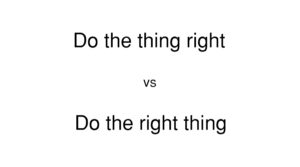
Efficiency is doing a task with the least possible time, money, or energy.
Effectiveness is doing the right task in the first place.
Why Effectiveness Comes First
You can be extremely efficient and still fail if you’re working on the wrong things.
When someone optimizes the wrong task, the resources they “save” don’t matter. They’re still being spent on something that doesn’t move the goal forward. This is why effectiveness precedes efficiency.
Once you know you’re doing the right work, efficiency becomes meaningful.
And when you combine both, clear priorities and smart execution, you get real performance.
Common Failures When Efficiency Comes First
1. Teams that automate the wrong process
Many teams rush to automate tasks to “save time”, but if the task itself shouldn’t exist, the automation only locks them deeper into an unnecessary workflow. They become efficient at producing something the organization doesn’t need.
2. Managers who measure activity instead of progress
Some managers push for more reports, more meetings, and more visible “busyness.” They create teams that look efficient because they move fast and deliver many outputs, but outputs are not outcomes. A team that delivers irrelevant work on time is still failing.
3. Companies that cut costs instead of solving problems
Cost-cutting feels efficient, but it often ignores the real issue.
Companies freeze hiring, reduce training, or shrink support teams, thinking they are optimizing, when in reality, they weaken their ability to execute the work that actually matters.
4. Students who optimize study techniques without choosing the right goals
Many students focus on studying “faster”, watching summaries, or optimizing note-taking systems, but once again, if they’re learning the wrong material or avoiding the core concepts, it doesn’t matter how efficient their method is.
The Relationship Between the Two
It doesn’t matter if you’re extremely efficient, fast, don’t spend a lot of resources, it you’re doing the wrong thing. And if you’re doing the wrong thing, then you’re not really efficient in the big picture. By definition, efficiency requires minimizing the resources spent to achieve a valuable objective. If you’re doing the wrong thing, you’re wasting resources. In that way efficiency follows effectiveness and vice versa.
Still effectiveness must come first, first you need to do the right thing, and then improve the way you do it.
Effectiveness guides direction, efficiency improves the journey.
